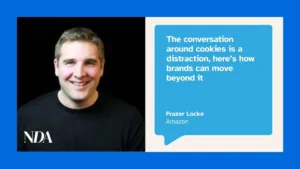By Marc Maleh, SVP Emerging Technology and Connected Experiences at Valtech
Since emerging from the isolation of the pandemic, we’ve been seeking more and more human-to-human experiences. With a boom in attendance at live entertainment, concerts and theme parks, consumers have enjoyed these exciting, in-person and interactive forms of entertainment which we were deprived of for some time.
With this spike in attendance, brick-and-mortar shopping has once again been pushed to reassess what it can offer customers. With a multitude of shopping options available, quite literally in customers’ pockets, advertising and retail experts need to look closer at the purpose of physical shopping experiences, how it intersects and connects to the digital world, and where to draw inspiration to ensure meaningful brand impact, consumer engagement and conversion.
Adding themed entertainment design to your brief
Whilst the rise of experiential shopping is nothing new, the post-Covid world has reinvigorated a new and exciting path for retail, there’s still a great deal of room for innovation in how experiences are designed. Yes, ‘retailtainment’ has made strides since the term was coined in 1999. But this concept is still evolving and growing. Many retailers are behind in delivering entertaining guest-like shopping experiences that essentially ‘borrow’ ideas from other industry sectors like hospitality and leisure. They continue to struggle with the intrinsic level of expertise required for retail strategies that are driven by entertainment, play and powered by technology and data.
This is where themed entertainment design comes in. With unbeaten expertise in designing an environment which is designed to entertain and sell, theme park designers can take your retail and commerce plans a notch above outdated ‘retailtainment’ initiatives. Utilising concepts like wish fulfilment and exit through retail we can think about retail spaces and experiences in a different way. As partner to Universal Studios Super Nintendo World, we are no stranger to these practices, and we’ve been able to apply them to our retail clients in new and novel ways.
Consider a trip to your favourite theme park, guests do not make the trip to buy a souvenir or merchandise. Guests seek an exciting and entertaining experience, which may result in a purchase as they look to bring a piece of the story and experience home.
The MAC Cosmetics’ concept store…
Just prior to Covid, we teamed up with MAC Cosmetics’ to design its concept store in New York. The shop offered a completely unique experience for customers to ‘try on’ makeup through virtual mirrors and used the latest touchscreen technology for makeup shade matching. Treating customers like guests provided an alternative path to purchase, ensuring they got the most out of their in-store experience while it lasted. We also made some wishes come true by providing experiences that made guests feel like they had professional makeup artists right there with them. At the same time, the memorable experience which includes takeaways like personalised product packaging and RFID triggered product content, makes them want to experience it all over again, locking in brand loyalty while fulfilling a wish.
With a 200% increase in engagement in the first month after the store’s opening, we proved that the physical store needed reimagining in order to retain digitally-savvy customers. Digital tools and playful experiences that made them feel unique, enhanced the customer experience through more entertaining means, marking the start of a new brick-and-mortar era for the brand
So, how can brands take inspiration from this? The combination of uncommon disciplines to ignite creativity and innovation is something retail marketing experts are no stranger to. But the intersection of themed entertainment, game theory and retail is certainly more outlandish and can offer exciting results, if executed properly. It is a way of innovating experiences and storytelling, while harnessing the latest technology, to enhance customer loyalty and create alternative purchase pathways. Valtech’s recent work with Super Nintendo World has only solidified the power we see in theme park experiences; because of this experience we can, and do, ‘borrow’ user journey and technology principles from there to take retail brand work to the next level.
By integrating ideas and themes pulled from other industries into your briefs, your brand’s commerce plan can truly stand out. Practices have to embrace creativity and difference or they risk falling victim to the same failings that digital experiences have been subject to. Theme park designers are skilled with designing experiences which can immerse customers throughout the space, and find ways to get guests to inhabit a story and connect emotionally with the brand or magical land they are in. When applied to retail, these theories have the potential to transform customer engagement, increase purchase and create greater opportunity for individuals to remember your brand.
Ensuring success through enhanced technology
We are all no stranger to a novelty ‘pop-up’ experience which has run throughout the last decade. The problem is that many times these short-term “retailtainment” initiatives fail to make a long-term impact on brand awareness and repeat visit or purchase.
The key to truly harnessing the power of themed entertainment theories in your brief is to look deeper into how theme parks harness and adapt technology at the intersection of storytelling and play to create seamless transitions from the physical to the digital. For “retailtainment” strategies to make a real splash, there is a certain level of design and architecture (both physically and technically) needed to perfect and integrate digital tools and data and make it a crucial aspect of business.
Retail spaces have an opportunity to harness customer data, in the same way as themed entertainment spaces, while offering a long-term route to transformed customer experience. Beyond the surface of the various attractions these parks offer, they are engineered to gain a 360 view of their customers by getting them to share their data willingly partially because there is a clear value exchange between the data and the experience. Retailers have a similar opportunity.
Analytics are used to track and gather visitor behaviour, through looking at the merchandise customers are purchasing, the times of day spaces are busiest and which rides are most popular. This data informs future decisions and many times new experiences and content to create a space directly suited to guest needs and expectations. We have even explored computer vision technology that can understand a person’s body language and how that maps to their sentiment on a product or retail experience all while keeping facial recognition out of the picture…aka not being creepy.
In a retail setting, this use of customer data has proven successful. With the launch of MAC Cosmetics’ concept store, the introduction of a ‘MAC Pass’ profile offered a seamless transition to customers’ online profiles. After ‘trying on’ different products on in-store virtual mirrors, customers had the option to save different ‘looks’ in their pass, which could be viewed online or in another store. The ‘MAC Pass’ saw the strongest customer engagement with more than a third of customers in store leveraging the capability. MAC Cosmetics’ harnessed data to provide more personalised insights for future initiatives.
Despite the turbulent economy and uncertainty felt on the street, physical stores may not be a thing of the past. They simply require rethinking and an ambitious approach which looks beyond what we already know.
Brands can come in to ensure that shopping in the present day becomes an unforgettable event and not just something on your to-do list. Through effective and well-planned use of play, storytelling and technology that enables a human driven experience, brands can create seamless connected experiences to ensure the longevity and viability of the physical retail experience. We believe that themed entertainment design and innovation holds the key to unlock the next level of retail innovation and take it even further.









